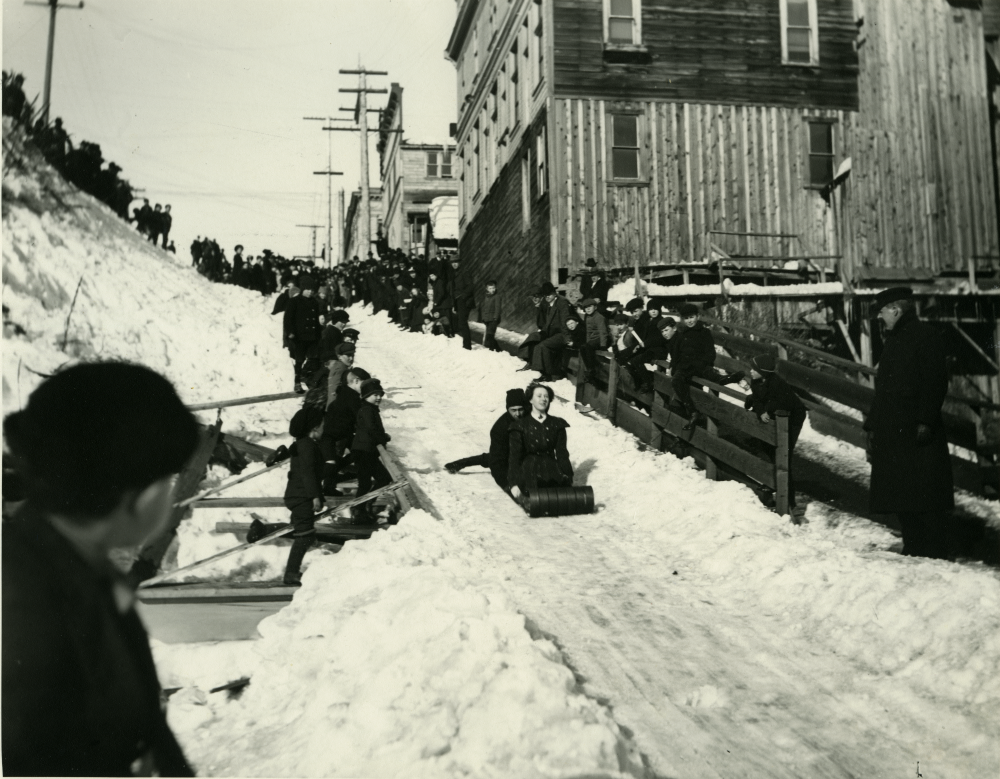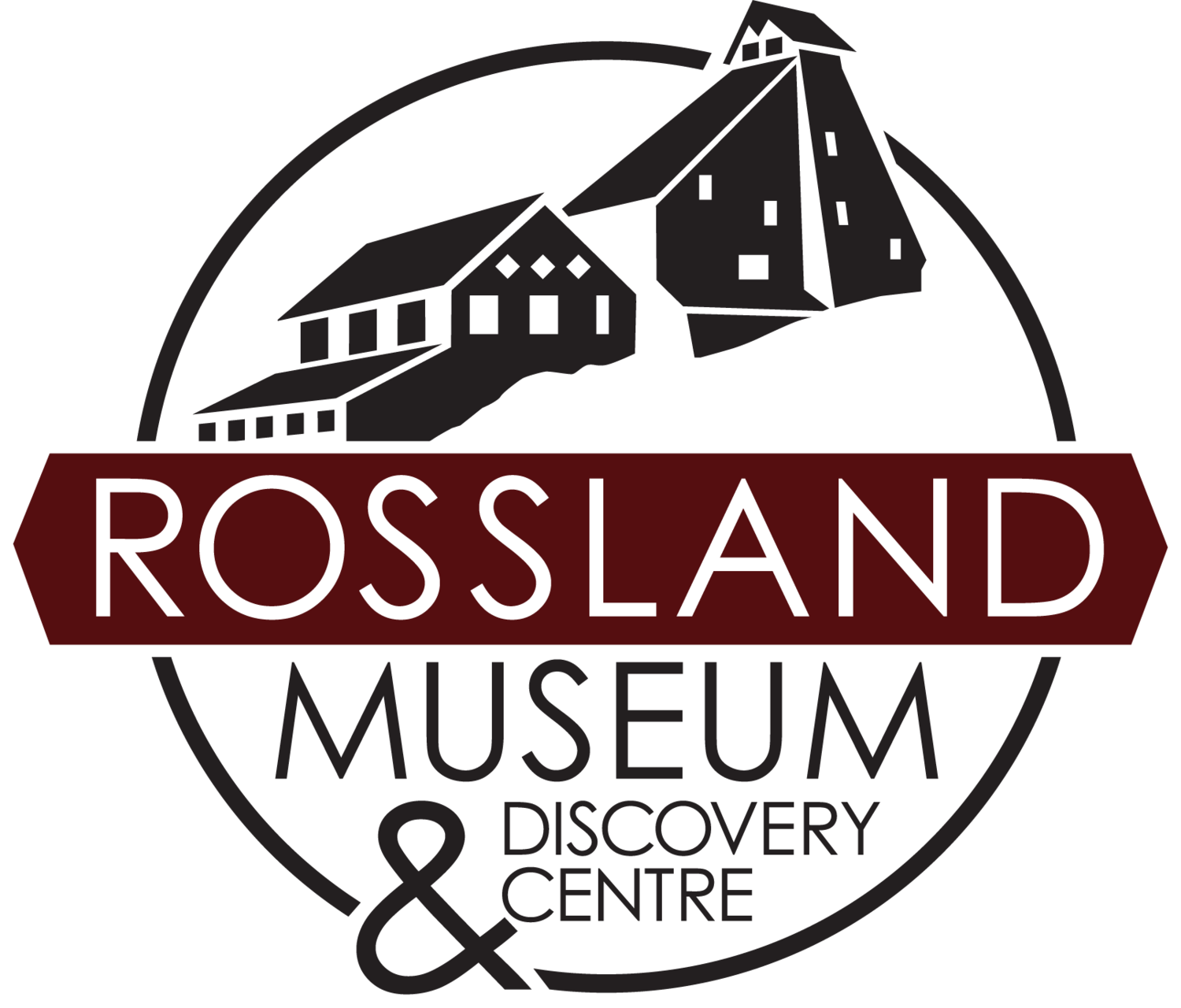Research & Essays
The essays and presentations included here try to capture some of the diverse aspects of Rossland’s history, including stories not yet incorporated into the “additional content” pages relating to our indoor exhibits, outdoor exhibits, and downtown heritage tour.
Essays have been written by a variety of Museum volunteers and staff. They reflect the varied perspectives of their respective researchers. Enjoy!

Skiing: Before or After We Built The Chairlift?
The Red Mountain chair lift transformed skiing in Rossland; it did not create it. Before the lift, the skiing community was active and vibrant, both athletically and socially. Skiing was not skiing as we know it today, in equipment, technique, skill, speed or the terrain casually conquered in a day on the slopes, but we had slalom, downhill of a sort and cross country races -- and a skilled and daring cadre of jumpers. Everyday skiing, however, was essentially Nordic, on the fields, trails and mountains north of the city, with the beginnings of alpine skiing on the steep slope adjacent to the ski cabin. Skiing occurred mostly on weekends, but our local hill had lights so we also had skiing at mid-week. Often, after skiing, the ski cabin rocked with music, singing and stomping that passed as dancing. We had exercise and we had fun, but most of us did not ski very well. The ski club was as much a social as it was an athletic institution. The story of skiing in the pre-lift days deserves to be told and retold. It was an important part of the history of that unique community, Rossland, that we know and love. This essay is my attempt to fill in some neglected aspects of that history.

The Origins of Rossland's Winter Carnival
Rossland was a wide open mining town in 1897, newly incorporated as a city, but only a few years away from being but a cluster of shacks on a bench on an isolated mountain side. As new gold-copper deposits were discovered and proven, men poured in, seeking employment in the mines. Business was expanding, the city was growing and people were exuberant and confident of the future. There were growing pains, of course, but there was also rapid development. Streets were laid out, houses, hotels, commercial buildings and schools were being built (and expanded), and transport facilities from the outside world were being completed and rapidly improved. A small American-owned company, the Rossland Water and Power Company, was supplying fresh water and electricity to parts of the city, but sewerage remained a serious problem. In the near future, the West Kootenay Power and Light Company would be formed and would begin providing electricity to the mines and the city from its hydro-electric works on the Kootenay River and the city would take over and develop the water system and build a comprehensive sewerage system. However, in 1897 Rossland was still a rather primitive frontier town facing another cold, dark, snow covered and, for many, dreary winter. But the city had an ice rink and an outstanding ski champion. Why not have a party to celebrate ice and snow sports and relieve some of the winter gloom -- and have it in February, the gloomiest month of them all.

The Chinese History of Rossland
I grew up in what was left of Rossland’s Chinatown in the late 1930s and 1940s and I have long wondered about the histories of the few Chinese men that I knew, particularly Lui Joe who sold us vegetables and old half-blind John who was the last resident of the Chinese Masonic Hall across the street from our house and who occasionally sawed wood in the middle of the night. Unfortunately, I cannot resurrect their stories but as I was preparing a history of my family I began to wonder about the broader history of the section of town in which I once lived and of the Chinese men who inhabited it.

Origins of Skiing: Olaus Jeldness
Olaus Jeldness was a "mining man," but he is a legend in Rossland, British Columbia, not for his accomplishments in mining, but for his exploits on skis. Yet, despite his local fame, surprisingly little is known about his life and some of the details regularly repeated in the extant literature are incorrect. In his adult life, skiing was important, at times a basic means of locomotion in winter, but more generally a relaxing and exhilarating relief from the stresses and anxieties of dangerous and demanding everyday activities. However, at root his life was an odyssey through the mining camps of North America (and some in Europe), in a determined quest for ever elusive riches, always guided by the optimistic belief that the next hole in the ground would deliver the big bonanza. His personal bonanza was found on an isolated mountainside outside Rossland. It gave him a modest personal fortune and for an extended time he led a prosperous life style. However, he died in less than prosperous circumstances, a victim of his own speculative nature and the depression of the 1930s. This paper reports what I have discovered in my attempt to understand Olaus Jeldness and his life.
-
2026
- Jan 7, 2026 Richie Mann: Packing for the 1956 Yukon Geological Survey Jan 7, 2026
-
2025
- Nov 11, 2025 Remembering Our Veterans: 2025 Veteran Highlights Nov 11, 2025
- Feb 12, 2025 Thrills and Spills! A History of Rossland Winter Carnival’s Bobsled Races Feb 12, 2025
-
2024
- Dec 2, 2024 The Old Dewdney Trail Dec 2, 2024
- Dec 2, 2024 Lights, Camera, Digitization! Dec 2, 2024
- Nov 5, 2024 Remembering Our Veterans: 2024 Veteran Highlights Nov 5, 2024
- Jun 17, 2024 Learning mxiɬp - Cedar in the Sinixt Homeland Jun 17, 2024
- Jun 5, 2024 Growing Up in Remarkable Times in Rossland Jun 5, 2024
- Jun 2, 2024 Collections Care: Textiles Jun 2, 2024
- Mar 14, 2024 A Legend Carved in the Slopes: The History of the Grey Mountain Grind Mar 14, 2024
- Feb 29, 2024 Speaker Series Replay: “The Ice Man from British Columbia” with Bill Hanlon Feb 29, 2024
- Jan 16, 2024 History of the S.S. Rossland Jan 16, 2024
-
2023
- Dec 6, 2023 Red Mountain Volunteer Ski Patrol Dec 6, 2023
- Jul 30, 2023 An Introductory History of Pride in the West Kootenays Jul 30, 2023
- Feb 14, 2023 Behind the Curtain: The History of the Rossland Light Opera Players Feb 14, 2023
- Feb 8, 2023 James W. Thompson Feb 8, 2023
- Jan 18, 2023 Smelter Wars with Ron Verzuh Jan 18, 2023
-
2022
- Nov 1, 2022 Rossland Red Cross: Women's Volunteer Service During the Second World War Nov 1, 2022
- Nov 1, 2022 Air Raid Precautions (ARP): Rossland Civilian Defence During the Second World War Nov 1, 2022
- Nov 1, 2022 James "Jimmy" Harper: Flight Lieutenant in the Royal Canadian Air Force (WWII) Nov 1, 2022
- Nov 1, 2022 Garth "Bunny" Beley: Flight Officer in the Royal Air Force (WWII) Nov 1, 2022
- Nov 1, 2022 Benjamin "Ben" Allen: Private in Princess Patricia's Canadian Light Infantry (WWI) Nov 1, 2022
- Mar 30, 2022 Jessie McQueen Mar 30, 2022
- Mar 30, 2022 The Rossland Club Mar 30, 2022
- Feb 8, 2022 Thor Heyerdahl Feb 8, 2022
-
2021
- Dec 14, 2021 Mike Wigley - Tales from a Splitboarder: Walking to Glory Dec 14, 2021
- Nov 9, 2021 Harry Measure: "Mountain Resorts & Resort Communities: Origins & Future Opportunities." Nov 9, 2021
- Nov 5, 2021 William "Spike" Treverton - Signalman for the 2nd Canadian Infantry Division WWII Nov 5, 2021
- Nov 5, 2021 Percival Knight Allen - Trooper for the Lord Strathcona's Horse Boer War Nov 5, 2021
- Oct 26, 2021 Rossland's Historic Cemeteries Oct 26, 2021
- Jul 20, 2021 Adrian Leslie: Whitebark Pine Ecosystem Restoration Jul 20, 2021
- Jul 9, 2021 The Gold Fever Follies: A Rossland Tradition for Over 30 Years! Jul 9, 2021
- May 27, 2021 Cindy Devine: "Ticket to Ride" - Cultivation of a Champion May 27, 2021
- May 13, 2021 Marilyn James: Sinixt Dialect Revitalization, Countermapping, and Resurgence May 13, 2021
- Mar 31, 2021 The Miners’ Union Hall (circa 1898) + The Rossland Provincial Courthouse (circa 1900)" Mar 31, 2021
- Feb 17, 2021 The "Spanish Flu" in Rossland Feb 17, 2021
-
2020
- Nov 5, 2020 Pte. Alfred Lindsay - Canadian Infantry 7th Battalion WWI Nov 5, 2020
- Nov 3, 2020 Edmund "Eddie" Thomas Cox - RCAF Pilot Officer (WWII) Nov 3, 2020
- Oct 30, 2020 The Rebekahs Oct 30, 2020
- Oct 28, 2020 Phyllis Gregory Turner Ross Oct 28, 2020
- Oct 27, 2020 Alice Jesse Weber Oct 27, 2020
- Oct 21, 2020 "The Girl" - A Memoir by Susie McClung Inghram (1936) Oct 21, 2020
- Jun 11, 2020 The Flying Steamshovel Jun 11, 2020
- May 22, 2020 Quarantine and Isolation in Early Rossland May 22, 2020
- May 21, 2020 British Columbia Firefighters’ Museum May 21, 2020
- May 5, 2020 The Liberation of the Netherlands and Victory in Europe May 5, 2020
- Mar 30, 2020 #MuseumAlphabet Mar 30, 2020
- Feb 25, 2020 Rossland Range Plane Crash Feb 25, 2020
- Jan 10, 2020 Music City: The Rossland City Band Jan 10, 2020
-
2019
- Jul 8, 2019 Historic Geology of the Rossland Region Jul 8, 2019
- Jul 5, 2019 Inventing the Walkie Talkie Jul 5, 2019
- Jan 25, 2019 Agnew & Co. (1879 - 1939) Jan 25, 2019
-
2018
- Oct 10, 2018 Some Little Known Incidents And Characters From Rossland's Golden Age Oct 10, 2018
- Aug 14, 2018 The Father of Rossland - Ross Thompson Aug 14, 2018
- Aug 14, 2018 Skiing: Before or After We Built The Chairlift? Aug 14, 2018
- Aug 14, 2018 The Origins of Rossland's Winter Carnival Aug 14, 2018
- Aug 14, 2018 The Chinese History of Rossland Aug 14, 2018
- Aug 14, 2018 Origins of Skiing: Olaus Jeldness Aug 14, 2018
